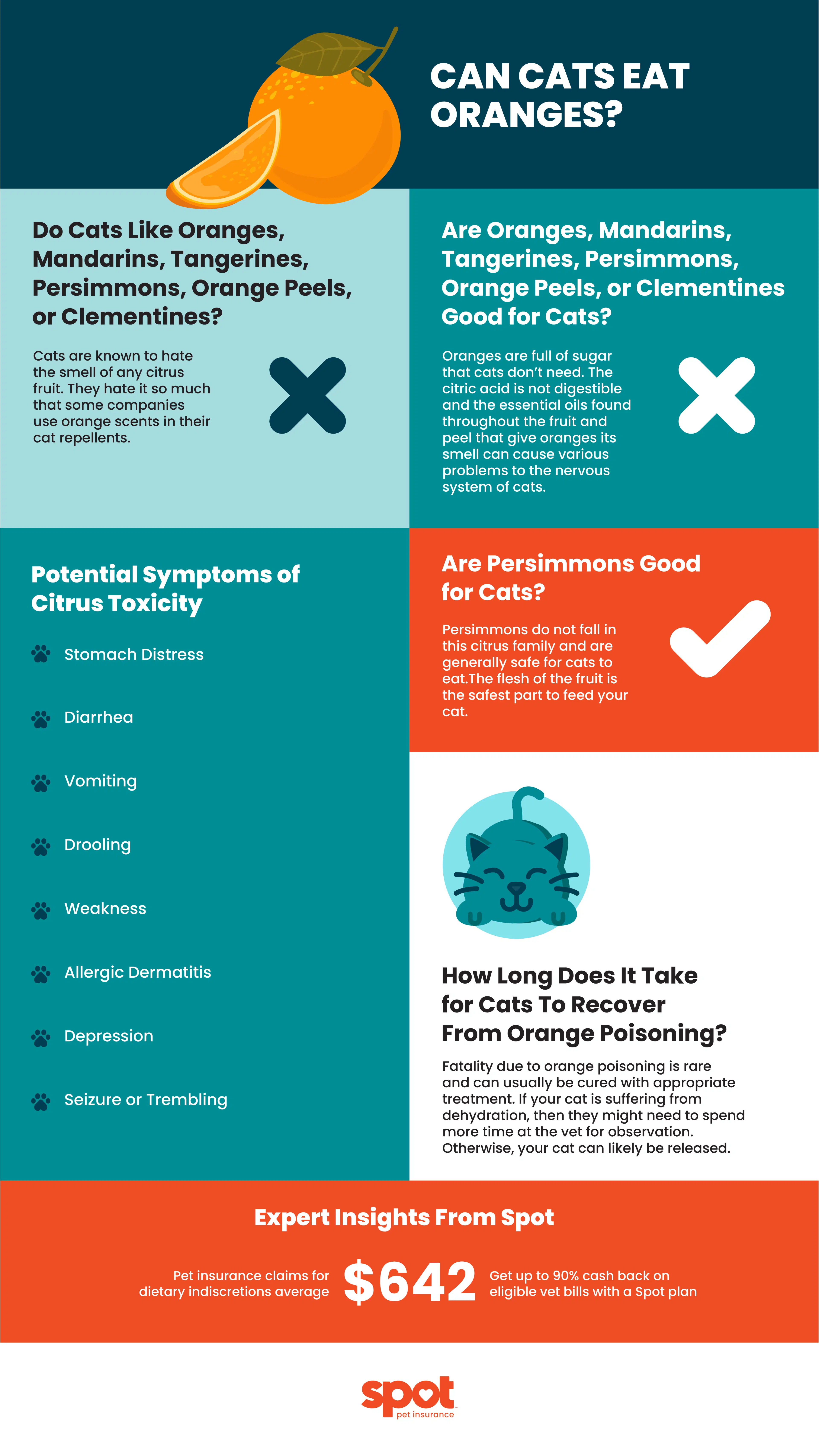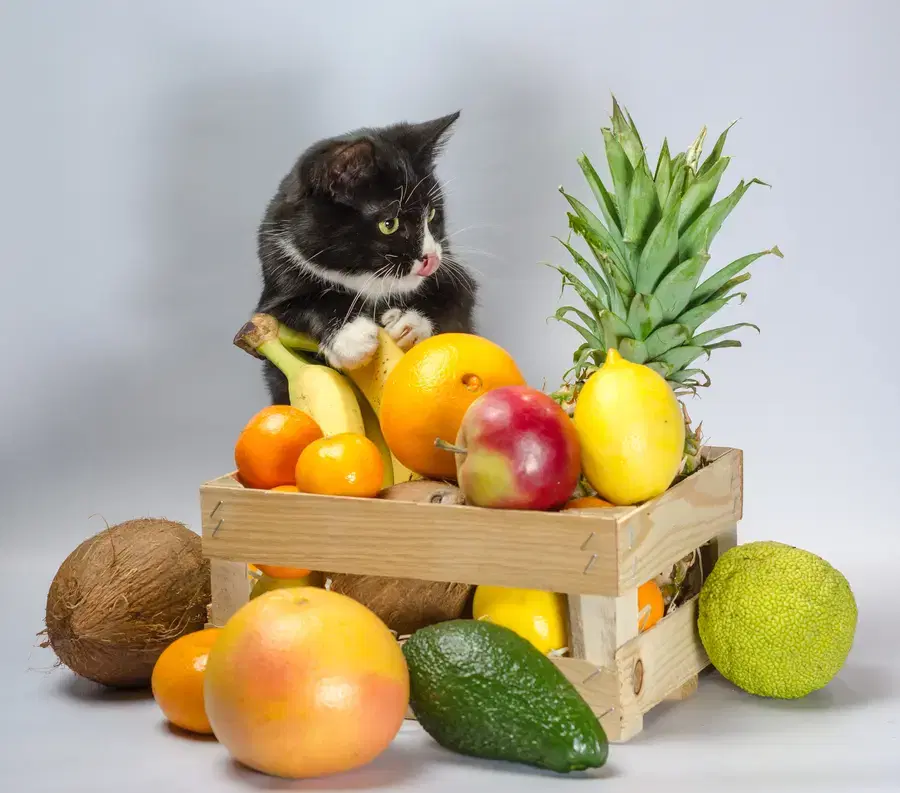Before we dive into this topic, the short answer to the question is, no, cats cannot and should not eat oranges, mandarins, tangerines, orange peels, or clementines. Your cat can enjoy persimmon though. Here are a few other fruits that cats can eat.
Let's take orange as the standard and compare the others to understand the difference between all these fruits. Mandarins are smaller and sweeter than oranges and have a flatter shape with thinner, looser skin. Tangerines are a type of mandarin but have a brighter orange color, rougher skin, and are a little less sweet. Persimmons, a.k.a. Kaki or Sharon fruit are not from the orange family and have a soft, jelly-like structure and the shape of a tomato. Clementines are the smallest type of oranges. They are seedless with a red-orange smooth and shiny skin with a super sweet taste.1
Now that we know the difference, we can ask the next question -

Do Cats Like Oranges, Mandarins, Tangerines, Persimmons, Orange Peels, or Clementines?
We humans love all these variations of oranges and clementines given their citric, tangy taste and refreshing smell. The story for cats is different though. Cats are known to hate the smell of any citrus fruit. They hate it so much that some companies use orange scents in their cat repellents.2 Cats can smell about 14 times better than us humans, making these smells more overwhelming for them.3 So, liking the taste of an orange is a very far-fetched idea for our cats.
Are Oranges, Mandarins, Tangerines, Persimmons, Orange Peels, or Clementines Good for Cats?
Let’s break down the nutritional content of Oranges. The figures would be similar for mandarins, tangerines, persimmons, and clementines.
One medium-sized orange contains the following4 –
Calories: 60
Fat: 0g
Protein: 1g
Sugar: 12g
Fiber: 3g
Vitamin A: 14mcg
Vitamin C: 70mcg
Calcium: 6% of DV
Potassium: 237mg
Carbs: 15.4g
Oranges are an amazing source of vitamin C with more than 100% of the daily required intake for humans. They help protect cells from damage, make collagen for smoother skin, boost immune systems, and fight free radicals that cause cancer.4 Oranges are a super fruit for humans. But for cats, the case is the opposite.
Oranges are full of sugar that cats don’t need. The citric acid is not digestible in a cat’s stomach and the essential oils found throughout the fruit and peel that give oranges its smell can cause various problems to the nervous system of cats. Lastly, oranges contain psoralens, which are toxic chemical compounds that can cause photosensitivity.2
Are Persimmons Good for Cats?
As mentioned above, persimmons do not fall in this citrus family and are generally safe for cats to eat. They can even provide some nutritional benefits to your cat. The flesh of the fruit is the safest part to feed your cat. While they may not enjoy the sweetness of it due to their lack of sweet taste buds, they may enjoy the texture. Avoid the leaves as they are very hard to bite and digest. Make sure it is ripe. Avoid the skin and the seeds altogether to help avoid choking or other problems.5
Persimmons should be given only as an occasional treat and not a part of your cat’s daily diet.
What Happens When Cats Eat Oranges, Mandarins, Tangerines, Orange Peels Or Clementines?
In case your cat accidentally eats any type of orange while you’re not looking, you should look out for the below symptoms of citrus poisoning6 –
Stomach distress
Diarrhea
Drooling
Weakness
Allergic dermatitis
Depression
Seizure or Trembling
How Much Orange Is Toxic To Cats?
If your cat has eaten only a small piece of the fruit, they’ll likely just have an upset stomach. But the larger the quantity ingested, the more risk of severe complications due to citrus poisoning.6
How Long Does It Take for Cats To Recover From Orange Poisoning?
Fatality due to orange poisoning is rare and can usually be cured with appropriate treatment. If your cat is suffering from dehydration, then they might need to spend more time at the vet for observation. Otherwise, your cat can likely be released back to you right away.6 Make sure that the first thing you do after coming home is move all the citrus fruits away from your cat’s reach.
Expert Insights From Spot
While sharing our favorite foods with our pets can be tempting, it's important to remember that not all human foods are safe for our pets. Spot's internal data shows that pet insurance claims for dietary indiscretions average $642*, highlighting the importance of caution and research before sharing snacks with your cat.
How Spot Pet Insurance Can Help
At Spot Pet Insurance, we know that unexpected accidents and illnesses can happen at any time. That’s why Spot offers accident and illness and accident-only plans that offer pet parents up to 90% cash back on eligible veterinary bills. Spot’s plans are customizable so you can create a plan that will best fit the needs of your pet and your budget. Choose your deductible, annual limit, and reimbursement from a range of options. Get a free quote today!
Conclusion
Several human foods can be safe and even good for your cat to eat. Oranges, mandarins, tangerines, orange peels, and clementines are not part of that list. They belong to the citrus family which is highly toxic to cats. Do not try to feed any amount, any form, or any type of orange to your feline friend. Persimmons are a fruit you can try once in a while in small quantities. You, by the way, go ahead and eat your oranges, mandarins, tangerines, persimmons, orange peels, and clementines. They can be really good for you and even form a good cure for a hangover!
Happy mood and health to your purry friend and lots of love and licks to you! (Licks by your cat).

With 10 years of experience as a pet parent, I aim to empower pet owners with insights into pet insurance and maintaining their pet's well-being. I aspire to be a trusted source, combining knowledge with a commitment to the welfare of our beloved pets.
*Jan 2019 to Aug 2024 administrator claims data.
"What’s the Difference between Oranges, Mandarins, Satsumas, Clementines, Tangerines?" S and J Mandarin Grove, www.sandjmandarins.com/whats-the-difference-between-oranges-mandarins-satsumas-clementines-tangerines/.
Rain, Kim. “Can Cats Eat Oranges?” Wag Walking 26 Oct. 2022, wagwalking.com/daily/can-cats-eat-oranges.
Piedad, Kristine. “Feline Olfaction and the Extraordinary Superpower of Cat Smell.” Felidae Conservation Fund, 22 Jan. 2024, felidaefund.org/news/general/feline-olfaction-and-the-extraordinary-superpower-of-cat-smell.
Bonvissuto, Danny. “Health Benefits of Oranges.” WebMD, www.webmd.com/food-recipes/health-benefits-oranges.
Le, Luxifa. “Can Cats Eat Persimmons? Vet-Reviewed Nutrition Facts.” Hepper, 2 Apr. 2024, www.hepper.com/can-cats-eat-persimmons/.
“Citrus Poisoning in Cats - Symptoms, Causes, Diagnosis, Treatment, Recovery, Management, Cost.” Wag Walking, n.d., wagwalking.com/cat/condition/citrus-poisoning.
The information presented in this article is for educational and informational purposes only and does not constitute or substitute for the advice of your veterinarian.












